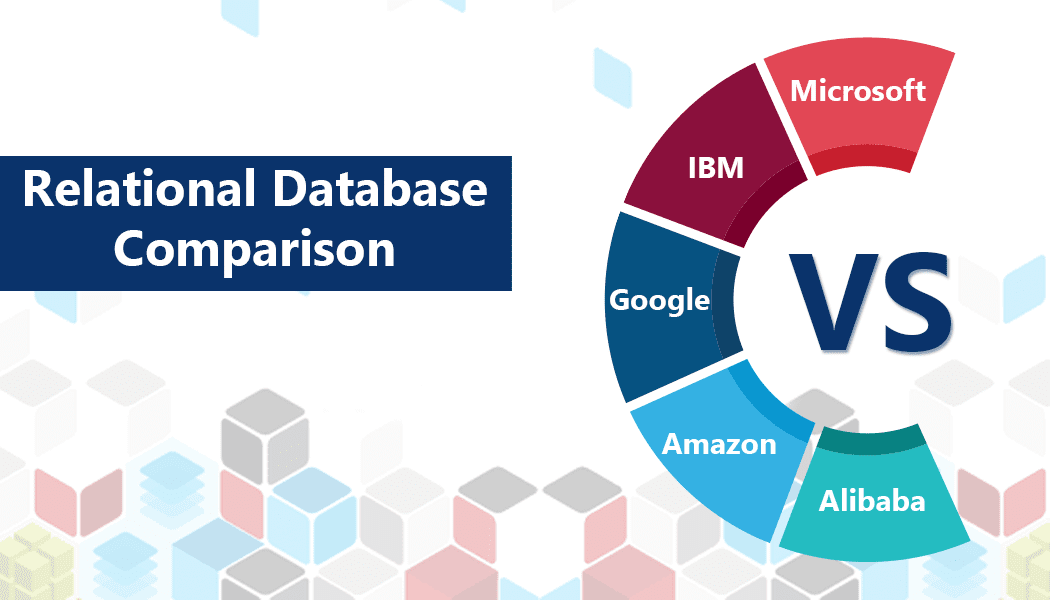Are you handling your client’s data, or recording transaction information? What about dealing with other systems or generating new data? Or, storing data from computers, phones, or IoT devices?
In the matter concerning the use of data and their structured storage, databases have become practically essential. Of the various ways in which companies can store data, establishing a relational database that runs on cloud computing platforms would appear to be among the most straightforward.
Relational databases offer a declarative method for identifying data that are put in tables and rows. They are built based on SQL (Structured Querying Language) that helps to extract and manipulate the data from associated tables in a database.
Relational databases are useful in handling highly structured data and offer support for ACID (Atomicity, Consistency, Isolation, and Durability) transactions. They also allow avoiding data duplication.
Current market trends of relational databases
Over the years, relational databases have become better, stronger, faster, and easier to work with. They have become the most widely accepted model for databases. A survey by StackOverflow’s developers found that 58.7% of organizations do prefer SQL or relational databases over other databases.
Also, the relational databases will account for over 80% of the total operational database market by 2022, according to IDC.
This confirms that more and more organizations will be using relational models in the coming years.
While it is still possible that companies can opt to build their own server database in the cloud, they can preferably choose to buy a relational database as a service, like ApsaraDB for RDS offered by Alibaba Cloud. What could be easier?
In this post, we are focusing on the best relational databases and comparing them to help you select the most suitable one for your next project.
Best relational databases – at a glance
- Alibaba Cloud ApsaraDB for RDS
- Amazon Relational Database Service
- Google Cloud Spanner
- IBM Db2 on Cloud
- Microsoft Azure SQL Database
Alibaba ApsaraDB for RDS
Alibaba Group entered the relational database market in 2016. In the overall database market, Alibaba generated the third largest cloud-only database management system (DBMS) revenue among global players in 2018.
Alibaba Cloud ApsaraDB for RDS is an online database service that helps you focus on your core business by controlling the administrative tasks that are related to managing a database. It supports RDBMS engines, such as MySQL, SQL Server, PostgreSQL, Postgre Plus Advanced Server (PPAS), and MariaDB.
Below is the diagram of ApsaraDB for RDS
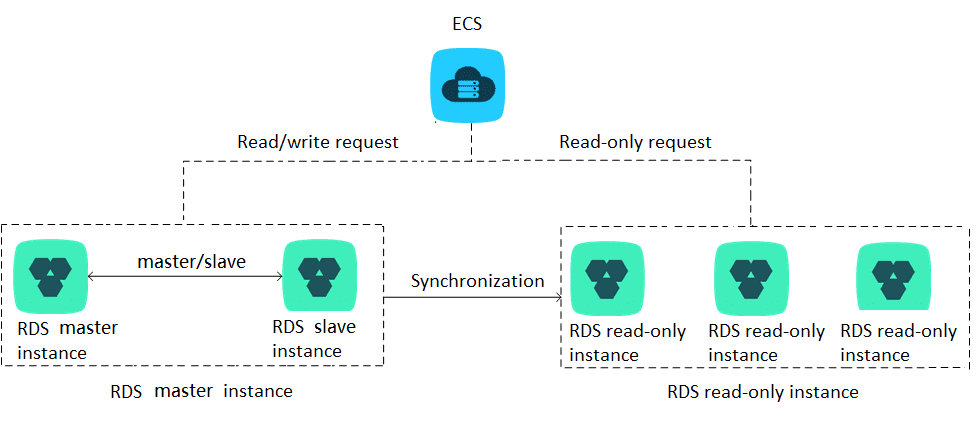
Source: AlibabaCloud
ApsaraDB for RDS manages complete database tasks such as monitoring, migration, backup, recovery, and other types of database functions. Further, it can also protect your network attacks or database threats.
Some of the main features of ApsaraDB for RDS include:
- Databases are built in a high availability infrastructure for continuous database services.
- Automated replication between primary and secondary instances, data backup, and log backup to assure data reliability.
- It protects your data from being stolen, as well as address security vulnerabilities on time.
- It guarantees the normal performance of database instances through regular maintenance and management.
- Automated backup.
- The user can expand storage and memory capacity at any time.
The service is billed based on your actual resource usage via two methods: Subscription and Pay-As-You-Go. See the pricing section for more details.
Amazon Relational Database Service
Amazon Relational Database Service (RDS) is a web service that aims to make it easy for users to set up, deploy, and scale a relational database in the cloud.
First released in October 2009, Amazon RDS currently supports MySQL, Oracle, PostgreSQL, MariaDB, and Microsoft SQL Server DB engines.
See the diagram of sharded database infrastructure built with Amazon RDS:
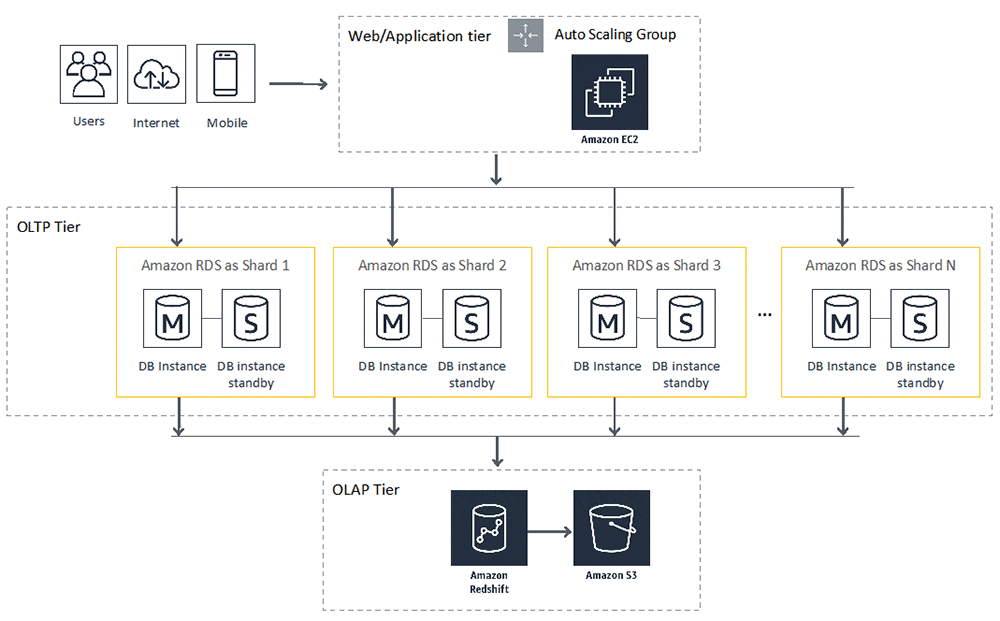
Source: Amazon
Amazon RDS can manage a broad range of database management tasks, like patching, migration, and backup & recovery.
Some of the main features of Amazon RDS include:
- Performance Insights dashboard that provides metrics allowing you to monitor the health of your relational databases.
- It automatically creates and saves backups of your RDS database instances.
- There is a high availability of your data through the Multi-AZ feature.
- It automatically expands database volume size as your database needs to grow.
- The data stored at rest is encrypted. It supports the use of SSL to protect the data in transit.
- Cost-effective: You need to pay a monthly charge for each database you create.
See the pricing section for more details.
ALSO READ: Database Migration Comparison: AWS, Google Cloud, Azure, IBM, Alibaba Cloud
Google Cloud Spanner
Spanner is Google’s fully managed, relational database service designed to provide SQL, scalability, schema, automatic, and synchronous replication for high availability.
This relational database will look similar to those working with SQL, but with less downtime of a traditional database. Google Cloud Spanner provides features including automatic multi-site replication and failover, consistent reads, and global transactions.

Source: Google
Spanner can provide strong consistency and high-performance transactions globally with availability SLAs of 99.999%, even in multi-region clusters. It transforms the administration and management of the database and makes the app development more systematic.
Some of the main features of Google Cloud Spanner include:
- It supports the SQL interface to read and write data.
- It provides highly consistent reads with no interruption.
- It lets you perform stale reads using the bounded or exact staleness types.
- Replication is synchronous and highly consistent.
- It secures your applications and data from fraudulent activity and spam.
- It generates real-time insights into massive volumes of data in a more organized, secure, and cost-effective way.
ALSO READ: Cloud DNS management comparison: Alibaba, Amazon, Google, IBM, Microsoft
IBM Db2 on Cloud
IBM was the first-ever company to build a relational database, System R. It is leading in this market with a wide range of solutions, led by its longstanding – db2 platform.
IBM Db2 on Cloud is a fully managed, cloud database that provides strong performance and high-availability option with a 99.99 percent uptime SLA. Db2 on Cloud can independently scale and compute, and leverage security updates.
See diagram of IBM Db2 on Cloud
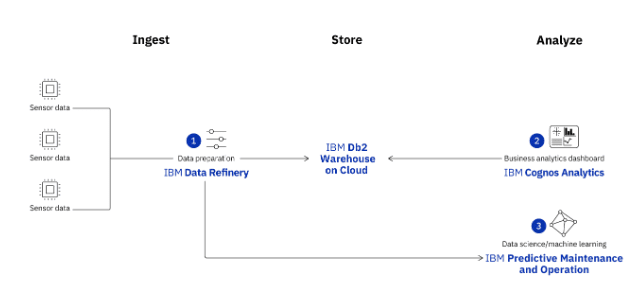
Source: IBM
Db2 on Cloud supports various data connectivity methods and offers Oracle PL/SQL compatibility. It is deployable on both IBM’s own cloud and Amazon Web Services (AWS), and you pay for what you use.
Some of the main features of IBM Db2 on Cloud include:
- It provides multi-cloud deployment capabilities.
- There is a 99.99 percent uptime service level agreement. This high availability option enables users to update and scale operations with zero downtime deployment of applications running on Db2 Cloud.
- It delivers deployment capabilities on an isolated network, accessible via a secure VPN.
- It simplifies AI-based application development using integrations with IBM AI and Machine Learning tools.
- It supports independent scaling of compute and storage. With compute, businesses can scale up when demand rises, and scale down when demand falls. With Storage, businesses can expand their storage when needs grow.
- It offers disaster recovery (DR) capabilities.
- It supports SSL connections and rolling security updates.
ALSO READ: Top public cloud storage providers in 2020 (with comparison)
Microsoft Azure SQL Database
Azure SQL is a fully managed, scalable, and intelligent relational database service that offers the widest SQL Server engine compatibility.
Azure SQL is developed on the SQL Server with 99.99 percent availability. It supports a built-in intelligence feature that reads app patterns and adapts to boost performance, reliability, and data protection. Azure SQL can be a great choice for cloud applications as it allows you to process both relational as well as non-relational data structures.
Below is the diagram of Azure SQL database
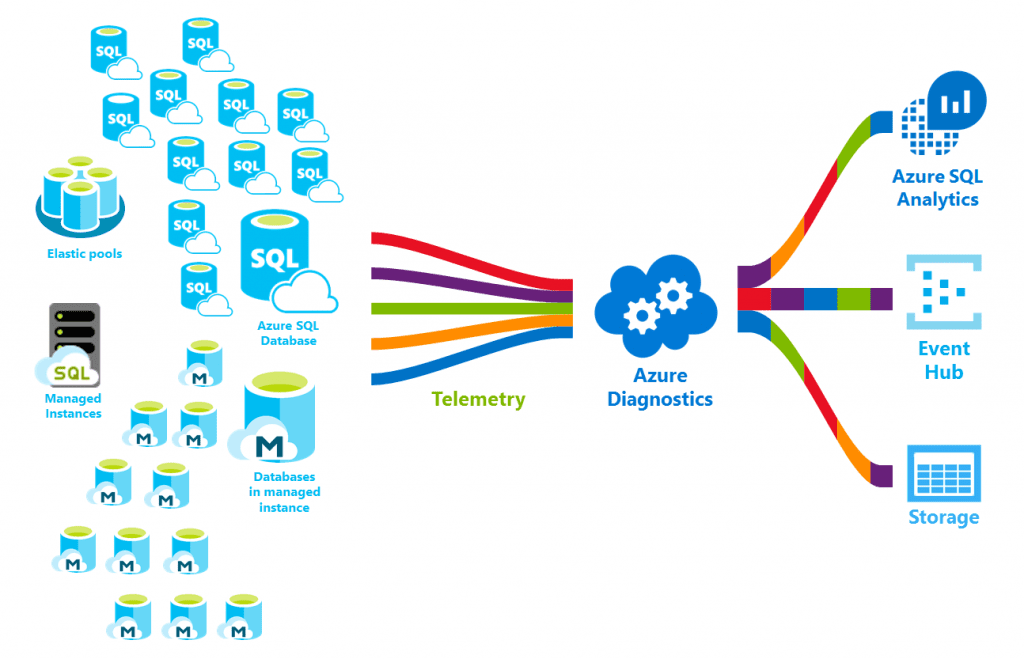
Source: Microsoft
Azure SQL provides high performance with multiple resource types, service tiers, and compute sizes. It delivers dynamic scalability without downtime, global availability, advanced security, and intelligent optimization.
Some of the main features of Azure SQL Database include:
- It continuously learns app patterns and adapts through built-in intelligence feature to boost performance, reliability, and data protection.
- You can scale as you need, with zero application downtime.
- It has built-in monitoring and alerting capabilities to find performance insights on a real-time basis.
- Its business continuity and scalability features provide automatic backup, disaster recovery, load balancing, high availability, and automatic recovery from the datacentre scale failure, without data loss.
- It protects your data with encryption, limiting user access to appropriate data, authentication, and continuous monitoring and auditing.
Azure SQL Database will charge you per database depending on their pricing tier.
Conclusion
This relational database comparison aims to provide you with information about different database options. We hope you found what you were looking for. In case you are still unsure or have questions, please feel free to contact us and our experts will talk to you.
Brief comparison: Alibaba vs Amazon vs Google vs IBM vs Microsoft
| Concepts | Alibaba | Amazon | IBM | Microsoft | |
|---|---|---|---|---|---|
| Primary database model | Relational DBMS | Relational DBMS | Relational DBMS | Relational DBMS | Relational DBMS |
| Cloud-based only | Yes | Yes | Yes | No | Yes |
| Server operating systems | Hosted | Hosted | Hosted | Linux, UNIX, Windows, IBM i, VSE, VM, and z/OS | Hosted |
| Data scheme | Yes | Yes | Yes | Yes | Yes |
| Typing | Yes | Yes | Yes | Yes | Yes |
| Supported programming languages | Nodejs, Python, PHP, Java, C# | C++, Go, Java, JavaScript, .NET, Node.js, PHP, Python, Ruby | C++, C#, Go, Java, Node.js, PHP, Python, Ruby | C++, C#, VB .NET, and other .NET languages, C, COBOL, Fortran, Java™, Perl, PHP, Python, REXX, Ruby and Ruby on Rails | C#, JavaScript, F#, Java, PowerShell, Python, TypeScript |
| Partitioning | Sharding | - | Sharding | Sharding | - |
| Replication | Yes | Yes | Yes, Master replication with 3 replicas | Yes | Yes, with 3 replicas |
READ NEXT: Load balancer comparison: Alibaba Cloud, AWS, Azure, Google Cloud, IBM



